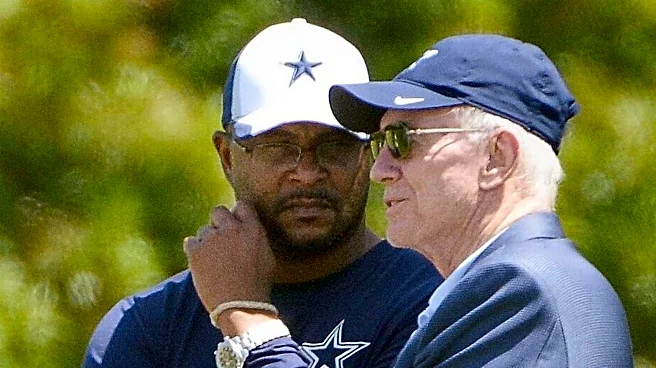What's Happening?
Aziz Ansari's debut feature film 'Good Fortune' attempts to tackle the complexities of economic inequity through a comedic lens. The film stars Ansari alongside Seth Rogen and Keanu Reeves, who plays an angel
named Gabriel. Set in Los Angeles, the narrative follows Arj, portrayed by Ansari, a struggling Hollywood film editor who resorts to gig work to make ends meet. His fortunes change when he lands a job with Jeff, a wealthy venture capitalist played by Rogen. However, after a misunderstanding involving company expenses, Arj is fired, prompting Gabriel to intervene. The angel's mission is to show Arj the realities of wealth and poverty through a magical role-reversal scenario. Despite its comedic elements, the film struggles to balance its satirical jabs at the wealthy with its sentimental undertones.
Why It's Important?
The film 'Good Fortune' highlights the ongoing societal discourse surrounding economic disparity and the gig economy's impact on individuals. By using comedy to address serious issues, Ansari's film invites audiences to reflect on the challenges faced by those in precarious financial situations. The portrayal of the wealthy as oblivious to the struggles of the less fortunate underscores the need for greater empathy and understanding in society. The film's exploration of these themes is particularly relevant in the context of increasing economic inequality in the United States, where the gap between the rich and the poor continues to widen.
What's Next?
While 'Good Fortune' offers a comedic take on economic issues, it also raises questions about potential solutions to these disparities. The film's narrative suggests that understanding and empathy are crucial in bridging the gap between different economic classes. As audiences engage with the film, it may spark discussions on the role of policy and societal change in addressing economic inequity. The film's release could also influence future projects in Hollywood that tackle similar themes, encouraging filmmakers to explore social issues through various genres.
Beyond the Headlines
The film's approach to economic disparity through comedy may also prompt discussions on the effectiveness of satire in driving social change. By blending humor with serious themes, 'Good Fortune' challenges viewers to consider the ethical implications of wealth and privilege. The film's portrayal of an angelic figure intervening in human affairs raises questions about moral responsibility and the potential for individuals to effect change in their communities. Additionally, the film's setting in Los Angeles, a city known for its stark contrasts between wealth and poverty, adds a layer of authenticity to its narrative.









